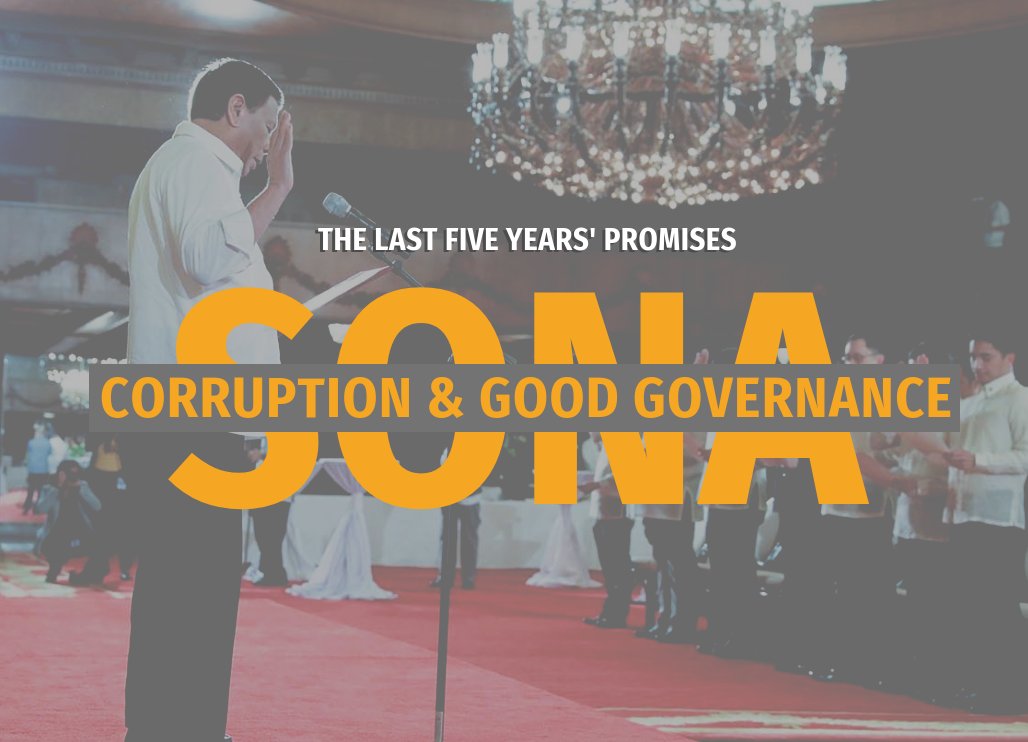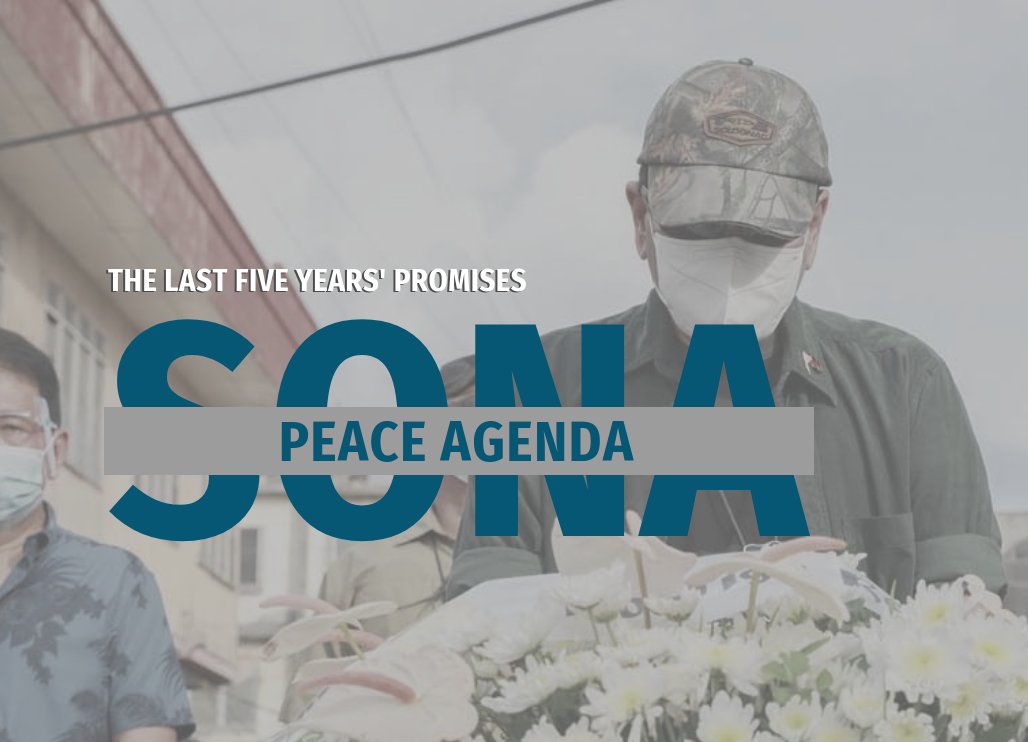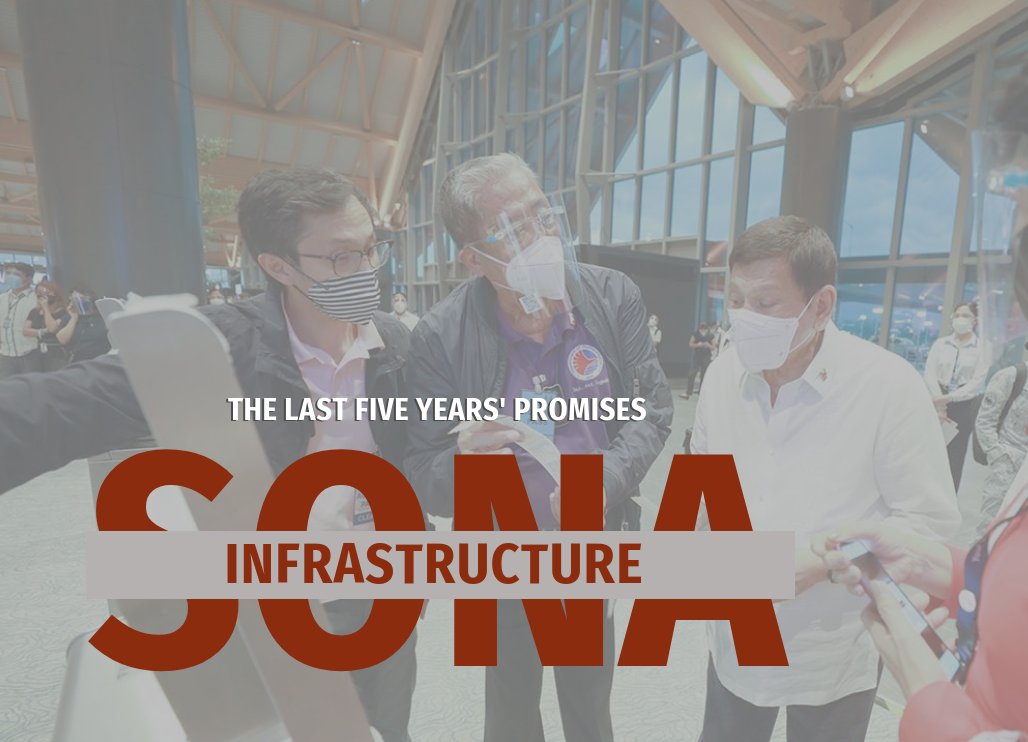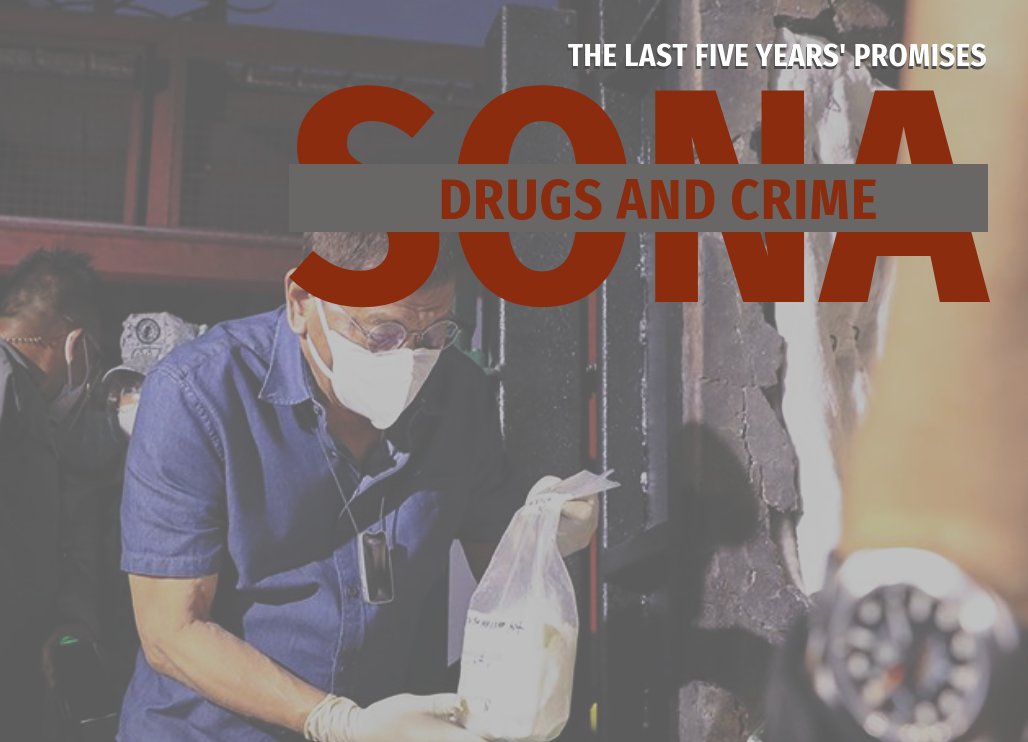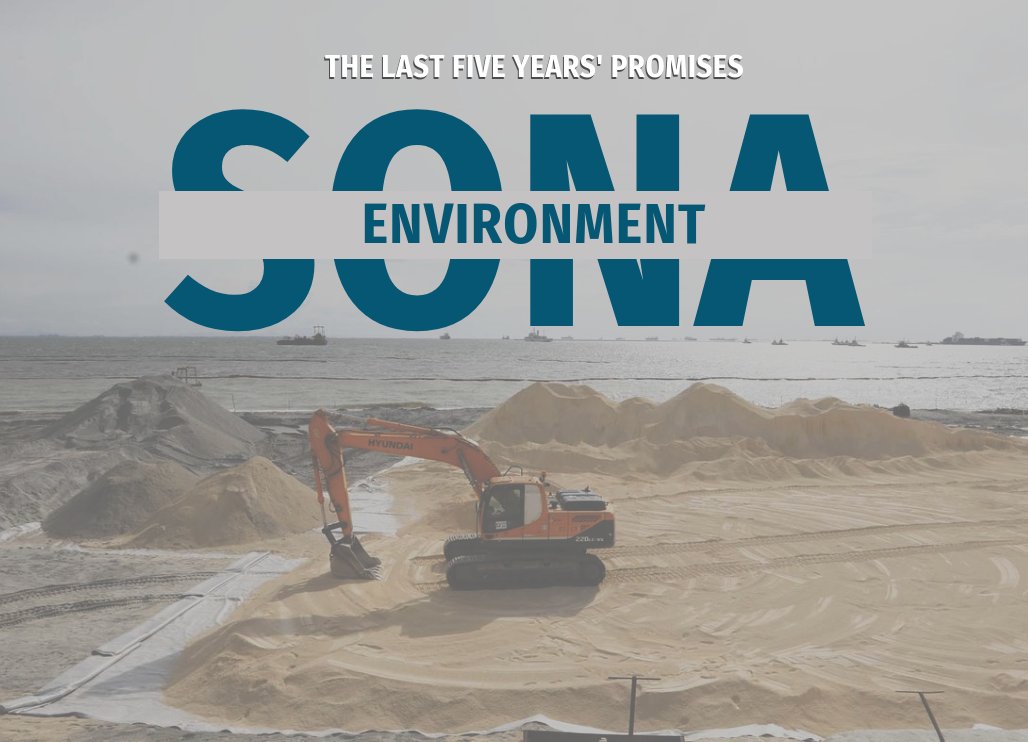Ending corruption in three to six months is one of President Rodrigo Duterte’s most well known promises. After five years in office, Duterte, during a Feb. 24 pre-recorded Meeting on COVID-19 with cabinet members, admitted that fulfilling this vow was “impossible.”
According to the 2020 Corruption Perception Index by independent Berlin-based anti-corruption organization Transparency International, the Philippines dropped to 115th place out of 180 countries, from 113th place in 2019, with a score of 34 out of 100, where “zero is highly corrupt and 100 is very clean.”
In 2016, during the start of Duterte’s term, the Philippines ranked higher at 101th place out of 176 countries. The study’s results were based on perceived levels of public sector corruption by businesspeople and experts.
In the same Feb. 24 briefing, Duterte said he will “dedicate the last remaining months … going after corrupt people, so that by the time… maminus-minus na (they will be reduced).”
VERA Files Fact Check tracks the promises the president has made on corruption and good governance in his previous SONAs since 2016. See how Duterte fared in his remaining seven promises:
PROMISE: Eliminate overregulation in gov’t services |
|
“[T]he landmark Ease of Doing Business and Efficient Government Service Delivery Act has been gaining momentum. We are closer to eliminating overregulation in government services.” (SONA 2020) “I reiterate…my directive to the government and instrumentalities (specifically LTO, SSS, BIR, LRA, and PAG-IBIG), including the LGUs and the government corporations: simplify…and make your services…client-friendly.” (SONA 2019) |
|
Duterte said the “top five agencies that need to drastically improve their service” and eliminate overregulation are:
On Feb. 17, 2020, LTO launched an online system for storing and processing citizen data. This includes a database on driver’s licenses, car registrations and penalty payment to digitize its services. The platform was supplied by German company DERMALOG.
Since launching the SSS Mobile app in September 2018 and partnering with PayMaya in December 2019, SSS has adopted a new version which now lets users access information about their membership, contributions and registration for loans and other features. As of May 31, 2021, the app has been downloaded over 15 million times, news reports said. The Retirement Claim Application (RCA) is also available online through My.SSS, as announced on Sept. 20, 2020.
On Jan. 8, the BIR issued Revenue Memorandum Circular (RMC) No. 5-2021, which provides simplified registration for the Computerized Accounting System (CAS), Computerized Books of Accounts, including Electronic Storage System, middleware and other similar systems. It has also listed its services available online on its site.
On March 25, the LRA held a soft launch of the Philippines Personal Property Security Registry (PPSR), where LRA clients can now access the PPSR through its website for the registration of both individual and juridical entity users accounts. This can be viewed online publicly as long as there is a user account and fees are paid.
On Dec. 13, 2019, Pag-IBIG launched its 24/7 online portal — the Virtual Pag-IBIG. It helps users chat with a Lingkod Pag-IBIG service representative for any inquiries. In 2020, several news reports noted the improvements of the online service which allows application for its cash loan program, such as the Multi-Purpose Loan (MPL) or a Calamity Loan. According to the Doing Business 2020 report by international financial institution World Bank, starting a business in the Philippines was made easier by “abolishing the minimum capital requirement for domestic companies; dealing with construction permits easier by improving coordination and streamlining the process for obtaining an occupancy certificate; and requiring greater disclosure of transactions with interested parties and enhancing director liability for transactions with interested parties.” Because of these factors, the report ranked the country as 95th, with a score of 62.8, out of 190 surveyed economies. It has improved since 2019 when it was placed 124th. On Feb. 21, 2020, Administrative Order (AO) No. 23 was issued, mandating anti-red tape reforms to eliminate overregulation. A month later, the program National Effort for the Harmonization of Efficient Measures of Inter-related Agencies (NEHEMIA) was launched to “reduce the time, cost, requirements, and procedures in sectors of economic and social significance by 52% within 52 weeks.” It is aligned with RA 11032 or the Ease of Doing Business Act of 2018. |
PROMISE: Make ‘all possible services’ available online; adopt ‘paper-less’ performance |
|
“I reiterate my call for all government instrumentalities to implement systems that shall make physical queuing a thing of the past. Panahon na para mawala [applause] na ang pila para mapagsilbihan ang gobyerno nang walang kahirapan para sa tao. The DILG, DBM, and the ARTA, along with all agencies and instrumentalities of government, are hereby directed to make [all] possible services available online. We need to adjust to and adopt a paper-less type business and work performance. We need e-governance [to provide] our people with the services they need [from] the comfort of their homes or workplaces. It will enable our bureaucracy to better transition into the ‘new normal’ and cut or minimize red tape.” (SONA 2020) |
|
On July 1, the Anti-Red Tape Authority (ARTA), along with stakeholders, signed the revised and expanded Joint Memorandum Circular (JMC), a year after JMC No. 1 was executed, to “reduce delays and streamline the processes to secure permits, licenses, and authorizations of Passive Telecommunications Tower Infrastructure (PTTIs).” ARTA Director General Jeremiah Belgica sought a meeting with the Philippine Statistics Authority (PSA) in sharing data, such as dates of birth and death, online to other government agencies to make transactions, such as processing applications and requests, easier. Four bills on e-governance, to promote the use of online transactions for government, have been pending since 2020 in the Senate. Memorandum Circular No. 2020 – 06 issued on Aug. 27, 2020, already mandates all government agencies, including LGUs, to provide online simplified services under the “New Normal.” The Department of the Interior and Local Government (DILG) called on LGUs to adopt a digital platform for contactless transactions to reduce COVID-19 viral transmission. DILG Region 8 is one of the offices that implemented the Document Management System (DMS) to transition to covering paperless services. |
PROMISE: Fast-track LGU’s processing of business permits, clearances, among others |
|
“I am directing [mayors and] also the DILG, Secretary Año of the local government[:] All clearances, permits emanating from your office that would need also (sic) your approval, must be out at the very least within three days.” (SONA 2019) |
|
Jeremiah Belgica, Director General of the Anti-Red Tape Authority (ARTA), said that electronic Business One-Stop Shops (eBOSS) kiosks — a free online platform from the Department of Information and Communications Technology (DICT) — should be equipped with desktops or laptops to assist clients, following orders made on Jan. 1. The order aims to process government transactions, such as business registrations and permits. In accordance with RA 11032, also known as the Ease of Doing Business Act of 2018, basic permits and documents should be processed within three days, through the online platform. Any non-compliant LGU should submit letters of explanation by July 14, 2021, to disclose failing to create their kiosk. On June 21, 2021, at least 580 LGUs have set up their eBOSS. Its physical counterpart, the National Business One Stop Shop (NBOSS), was also launched to submit documents and other registrations. Its first office opened on Feb. 28 at the Securities and Exchange Commission in Pasay City. Similar to eBOSS, the DICT, together with the DILG, launched the Go SmARTApp, donated by the Multisys Technologies Corporation, which can also help in automating business permits and licenses online. On May 4, around 1,870 LGUs already created their Committee on Anti-Red Tape (CART), tasked to simplify transactions, Belgica announced. |
PROMISE: Enact Magna Carta for barangays |
|
I suggest Congress should also enact the Magna Carta for Barangays. (SONA 2019) |
|
The House of Representatives has filed 42 bills aiming to enact a Magna Carta for barangays – all of which are pending. The DILG has expressed support for Senate Bill (SB) 96, which aims to classify barangay officials as regular government employees with fixed salaries and benefits, like other government workers. It also targets providing each barangay with health centers, transport services and a barangay hall, among others. However, all seven bills in the Senate aiming to enact the Magna Carta remain pending since 2019. |
PROMISE: Get rid of graft and corruption in the government
|
|
“Time and again, I have stressed that corruption must stop. Corruption is like a leech that it bleeds the government of funds programmed for its infrastructure and other social development projects…we run after those who steal the people’s money…” (SONA 2018) “I will never tolerate corruption in my administration, not even a whiff of it. Let the dismissal of several high-ranking officials — whom I myself appointed — serve as a warning to all that I will never back down on my commitment to cleanse this government and corporation.” (SONA 2017) “…[T]hose who betrayed the people’s trust shall not go unpunished and they will have their day in Court. And if the evidence warrants, they will have their day of reckoning too.” (SONA 2016) |
|
Former Department of Justice (DOJ) Secretary Vitaliano Aguirre II is one of Duterte’s appointees who resigned or was dismissed after being linked to corruption, but was only reappointed to another office. On. Jan. 20, 2021, Aguirre was appointed as National Police Commission (NAPOLCOM) Commissioner and Vice-Chairman and Executive Officer (VCEO). As then DOJ secretary, he was tagged on March 2, 2020, by special envoy to China Ramon “Mon” Tulfo, as a protector of the “pastillas” scam which allowed Chinese tourists to freely enter the country in exchange of bribery under the Bureau of Immigration, which is under the DOJ. The former Secretary denied the allegations in his alleged role in the scheme. Earlier in 2018, Aguirre was tagged in the dismissal of charges against accused drug lords Kerwin Espinosa and Peter Lim. He apologized to the prosecutors who dropped the case by saying it is “not correct” to order an investigation in the case’s dismissal. A month later, he filed for resignation, which Duterte accepted. According to Chief Presidential Legal Counsel Salvador Panelo during a Jan. 13 episode of this talk show Counterpoint, Duterte appointed Aguirre as NAPOLCOM Commissioner because he saw “potential” in him. Aguirre is Duterte’s fraternity brother from San Beda College of Law. During a March 31 briefing, the Presidential Anti-Corruption Commission (PACC) named three “problematic” government offices when it comes to corruption. These are the Department of Public Works and Highways (DPWH), BIR, and BOC. On Jan. 7, the DPWH dismissed 14 district engineers due to their involvement in corruption, according to Sec. Mark Villar. Villar created a Task Force Against Graft and Corruption (TAG) in October 2020 to probe corruption allegations. It also added that the Complaints Validation and Investigation Committee (CVIC) was “reconstituted” to fast-track complaints against any DPWH official. The DPWH and the Department of Health (DOH), in April, signed the Manifesto of Pledge of Cooperation and Oath of Honesty for ‘Project KASANGGA: Tokhang Laban sa Korapsyon’ — a program which aims for government to commit to the fight against corruption within their own agencies. The BIR and the Department of Transportation (DOTr) took their Oath of Honesty and signed the Reaffirmation of Integrity and Pledge of Cooperation with the Presidential Anti-Corruption Commission (PACC) also in April, via online ceremony. During Duterte’s televised talk to the People on June 14, he announced that some personnel were dismissed for demanding P400,000 bribe in exchange for “approval of signed tax payment forms for the settlement of Dealco Farms purported tax liabilities.” |
PROMISE: Prosecute those liable for Philhealth fraud issue |
|
“I ordered the NBI to arrest and cause the prosecution of those liable. I appointed a new PhilHealth President…and gave him marching orders to prioritize ridding the agency of corruption…These culprits will have their day of reckoning in court.” (SONA 2019) |
|
Duterte appointed on Aug. 30, 2020, former National Bureau of Investigation (NBI) Director Dante Gierran as new President of government insurance agency PhilHealth, replacing retired Army General Ricardo Morales who resigned due to medical reasons. Former PhilHealth anti-fraud legal officer Thorrsson Montes Keith resigned from his post on July 23, 2020, because of “widespread corruption.” In a senate investigation a month later, on Aug. 4, Keith claimed that some P15 billion went missing because of frauds. A year later, PhilHealth denounced in a June 28 press release allegations of a P15- billion scam under the Interim Reimbursement Mechanism (IRM) by saying P14.876 billion or 99.37% of the total had already been disbursed, countering Keith’s claim. Two weeks before Gierran became the head of PhilHealth, lawmaker and House Committee on Public Accounts Chairman Mike Defensor said that the government insurance agency allocated P1.49 million to 51 healthcare facilities despite ongoing fraud cases. In 2020, over 9,200 cases of fraud were discovered by PhilHealth’s investigating body and another 325 were uncovered in January 2021. During a Feb. 15 #LagingHandaPH press briefing, Gierran said that there has been a reshuffling of personnel since he sat as PhilHealth President. PhilHealth “regional vice presidents holding positions in their respective regions have been assigned to different regions from the regions that they used to occupy,” he said. Gierran also added that there have already been officials “suspended by the Ombudsman because of cases filed by the NBI,” as well as pending PhilHealth cases even before he assumed office. |
PROMISE: Cleanse ranks of Bureau of Customs and PNP |
|
“Concerning the unscrupulous persons manning our ports and scalawags in uniform, we have been unyielding in our reforms to weed them out of public service…There is no sacred cow, as the saying goes, in my Administration…[I]f I cannot dismiss them for the reason that there is a security of tenure, I will just allow them to have their plantilla positions but they have to report to Congress everyday to help me in (sic) the huge paperwork that we have to do everyday.” (SONA 2019) |
|
In a speech on Nov. 5, Duterte named more than 20 dismissed BOC officials, many of whom were charged with gross neglect of duty and grave misconduct. On Feb. 16, Justice Secretary Menardo Guevarra said the Task Force Against Corruption (TFAC) received over 200 reports of corruption complaints of citizens against national government agencies, government-owned or -controlled corporations, and LGUs. Nearly three quarters of the total reports are “actual corruption cases,” and 69 complaints are either undergoing evaluation or have been evaluated. A month later, a Manifesto against corruption was signed by BOC officials to support anti-corruption initiatives. On June 25, former PNP Chief Jesus Verzosa and five other officials, were pronounced guilty of graft for purchasing rubber boats in 2009, amounting to P131.5 million. They are sentenced to 6 to 8 years imprisonment. According to the PNP Accomplishment Report for 2020, at least 4,000 of its personnel were “penalized for engaging in different illegal activities.” On June 4, PNP Chief Guillermo Eleazar said the police will be wearing body cameras to avoid possible abuse of authority during operations. Eleazar assured the Commission on Human Rights that the PNP would uphold privacy with policies for data protection. On Oct. 30, 2020, then PNP Chief Gen. Camilo Cascolan ordered a lifestyle check on policemen to weed out corruption. |
Sources
Introduction
- Presidential Communications Operations Office (PCOO), Kumusta Po Mahal Kong Kababayan | Meeting on COVID-19 Concerns and Talk to the People on COVID-19, February 24, 2021
- Transparency International, CORRUPTION PERCEPTIONS INDEX 2020
- Transparency International, CORRUPTION PERCEPTIONS INDEX 2019
- Transparency International, CORRUPTION PERCEPTIONS INDEX 2016
On eliminating overregulation in gov’t services
- ABS-CBN News, SSS unveils ‘improved’ version of mobile app, June 30, 2021
- Anti-Red Tape Authority (ARTA), ARTA launches Program NEHEMIA to cut gov’t processes by 52% within 52 weeks, March 4, 2020
- Bureau of Internal Revenue (BIR), eServices
- Bureau of Internal Revenue (BIR), Revenue Memorandum Circular No. 5-2021, Dec. 28, 2020
- Business Mirror, Pag-IBIG Fund cash loan application now online, execs say, Aug. 12, 2020
- Business Mirror, SSS launches redesigned mobile app for members and employers, June 30, 2021
- Business World Online, Pag-IBIG launches online portal, Dec. 13, 2019
- DERMALOG, LTO opens new digital governance solution in Metro Manila, Feb. 18, 2020
- Department of Finance (DOF), SSS improves mobile app for easier use, June 30, 2021
- Land Registration Authority (LRA), PHILIPPINES PERSONAL PROPERTY SECURITY REGISTRY (PPSR) FREQUENTLY ASKED QUESTIONS
- Land Registration Authority (LRA), LRA Launches Creation of User Accounts in the PPSR, March 25, 2021
- Manila Times, Virtual Pag-IBIG open to loan seekers, Aug. 13, 2020
- Manila Bulletin, Pag-IBIG announces improvements to online service portal, Aug. 13, 2020
- Official Gazette, Administrative Order no. 23, Feb. 21, 2020
- Official Gazette, Republic Act No. 11032, May 28, 2018
- Official Gazette, Fourth State of the Nation Address, July 22, 2019
- Philippine News Agency (PNA), SSS improves mobile app for easier use, June 30, 2021
- Social Security System (SSS), SSS launches contribution payments through the SSS Mobile App with PayMaya, Paymaya is now SSS’ newest collection partner, Dec. 19, 2019
- Social Security System (SSS) Facebook page, Online Filing of Retirement Claim Application (RCA) now available, Sept. 10, 2020
- World Bank, Doing Business 2020
On making ‘all possible services’ available online; adopt ‘paper-less’ performance
- Anti-Red Tape Authority (ARTA), ARTA, key agencies sign expanded JMC for streamlining of telco towers permitting process, July 1, 2021
- Anti-Red Tape Authority (ARTA), ARTA pushes for online data sharing of gov’t agencies to ease application processes, to meet with PSA, July 9, 2021
- Anti-Red Tape Authority (ARTA), Memorandum Circular No. 2020, Aug. 27, 2020
- Anti-Red Tape Authority (ARTA), Revised Joint Memorandum Circular No.: 01, Series of 2021, June 11, 2021
- Central Business Portal, Central Business Portal home page
- Department of the Interior and Local Government (DILG), DILG to LGUs: Go digital to impede COVID-19 contagion, boost economic activity, July 8, 2020
- Department of the Interior and Local Government (DILG), DILG Region 8 adopts online Document Management System, July 24, 2020
- Senate, Senate Bill No. 1683 or the E-Government Act of 2020, July 13, 2020
- Senate, Senate Bill No. 1738 or the E-Governance Act of 2020, July 27, 2020
- Senate, Senate Bill No. 1750 or the E-Government Services Act of 2020, July 29, 2020
- Senate, Senate Bill No. 1891 or the E-Government Act, Oct. 22, 2020
On fast-tracking LGU’s processing of business permits, clearances, among others
- Anti-Red Tape Authority (ARTA), ARTA Czar Belgica: Go.Smartapp to connect to other gov’t platforms, safe for public use, April 16, 2021
- Anti-Red Tape Authority (ARTA), ARTA eyes 100-percent eBOSS compliance in LGUs by end of President Duterte’s term, June 25, 2021
- Anti-Red Tape Authority (ARTA), ARTA Sec. Belgica prods barangays to integrate with eBOSS platforms, June 17, 2021
- Anti-Red Tape Authority (ARTA), ARTA to LGUS: implement business one-stop shops, Jan. 1, 2021
- Anti-Red Tape Authority (ARTA), Over 35K permits released with ARTA’s help, nearly 1.2k complaints against anti-red tape violators acted upon, July 2, 2021
- Anti-Red Tape Authority (ARTA), Sec. Belgica to LGUS: set up kiosks where public will be assisted in navigating eBOSS, July 6, 2021
- Anti-Red Tape Authority (ARTA), Statement of ARTA Secretary Jeremiah Belgica on the creation of CART in LGUs
- Department of Information and Communications Technology (DICT), Gov’t initiative to streamline business registration now operational, March 2, 2020
- Department of Information and Communications Technology (DICT), LGUs to automate business registration processes in the new normal, April 14, 2021
- Official Gazette, Republic Act No. 11032, May 28, 2018
On enacting Magna Carta for barangays
- Department of the Interior and Local Government (DILG), DILG backs Senate bill classifying barangay officials as regular gov’t employees, Jan. 28, 2019
- Senate, Senate Bill No. 96 or Magna Carta for Barangays, July 1, 2019
On getting rid of graft and corruption in the government
- ABS-CBN News, Duterte accepts Aguirre’s resignation as justice chief, April 5, 2018
- ABS-CBN News, Ex-justice chief Aguirre tagged in ‘pastillas’ bribery scheme, March 2, 2020
- Business World Online, Duterte accepts Aguirre resignation, April 5, 2018
- CNN Philippines, Aguirre apologizes to justice prosecutors involved in dismissal of raps vs. Kerwin Espinosa, Peter Lim, March 26, 2018
- CNN Philippines, Aguirre denies being mastermind of ‘pastillas’ scheme, Sept. 22, 2020
- CNN Philippines, Ex-DOJ chief Vitaliano Aguirre tagged as protector of ‘pastillas’ scheme, March 2, 2020
- Department of Public Works and Highways (DPWH), DPWH Signs Manifesto To Intensify Efforts Vs Graft And Corruption, April 12, 2021
- Department of Public Works and Highways (DPWH), Villar Creates Task Force vs Graft and Corruption, Oct. 20, 2020
- GMA News Online, Aguirre apologizes to prosecutors under probe over dismissal of drug raps vs. Peter Lim, Kerwin Espinosa, March 26, 2018
- Inquirer.net, Aguirre apologizes to prosecutors in Espinosa, Lim case dismissal, March 26, 2018
- Manila Bulletin, Aguirre denies involvement in ‘pastillas’ scheme, March 2, 2020
- Manila Standard, 14 DPWH district engineers sacked on corruption raps, Jan. 7, 2021
- National Police Commission (NAPOLCOM), NAPOLCOM welcomes Vice-Chairman and Executive Officer Vitaliano N. Aguirre II
- Presidential Anti-Corruption Commission (PACC), The ceremonial signing of the Reaffirmation of Integrity and Pledge of Cooperation and Oath of Honesty between the Presidential Anti-Corruption Commission (PACC) and the Department of Transportation (DOTr) take place via virtual convention on April 28, 2021
- Presidential Anti-Corruption Commission (PACC), The Presidential Anti-Corruption Commission (PACC) and Anti-Red Tape Authority (ARTA), in cooperation with the Bureau of Internal Revenue (BIR), hold a virtual manifesto signing of the pledge of cooperation and oath of honesty dubbed, “Project KASANGGA: Tokhang Laban sa Korapsyon at Red Tape” on April 22, 2021
- Presidential Anti-Corruption Commission (PACC), The Presidential Anti-Corruption Commission (PACC) and Department of Health (DOH) hold the signing of the Manifesto of Pledge of Cooperation and Oath of Honesty for ‘Project KASANGGA: Tokhang Laban sa Korapsyon’ via virtual convention on April 30, 2021
- Presidential Communications Operations Office (PCOO), President Duterte names personnel dismissed from service due to corruption, June 15, 2021
- Presidential Communications Operations Office (PCOO), Speech of President Rodrigo Roa Duterte during the Awarding of Outstanding Farmers, Fisherfolks and Coastal Communities (Gawad Saka 2017 and Malinis at Masaganang Karagatan 2017), April 5, 2018
- Philstar.com, Aguirre tagged as ‘protector’ of ‘pastillas’ racket, denies accusations, March 2, 2020
- Philippine News Agency (PNA), 14 district engineers relieved due to corruption: DPWH, Jan. 7, 2021
- Philippine News Agency (PNA), Duterte accepts Aguirre’s resignation, April 5, 2018
- PTV News, DPWH confirms dismissal of district engineers, Jan. 7, 2021
- PTV News, #LagingHanda | Project Kasangga: Tokhang Laban sa Korapsyon, ilulunsad ng PACC, March 31, 2021
- RTVM, Counterpoint by Secretary Salvador Panelo, Jan. 13, 2021
- UNTV News & Rescue, Aguirre denies links to ‘pastillas scheme’, Sept. 22, 2020
On prosecuting those liable for Philhealth fraud issue
- ABS-CBN News, PhilHealth chief Ricardo Morales resigns, Aug. 26, 2020
- CNN Philippines, 51 hospitals with fraud cases still got ₱1.49 B from PhilHealth — lawmaker, Aug. 17, 2020
- CNN Philippines,PhilHealth chief Morales resigns, Aug. 26, 2020
- CNN Philippines, Whistleblower claims ₱15 billion stolen by PhilHealth execs in fraud schemes, Aug. 4, 2020
- GMA News Online, Nearly 9,200 health insurance fraud cases reported in 2020 —PhilHealth, March 14, 2021
- Inquirer.net, P15 billion went to PhilHealth ‘syndicate’ – whistleblower, Aug. 5, 2020
- Manila Bulletin, 51 hospitals with pending cases received R1.49 B from PhilHealth – Defensor, Aug. 18, 2020
- Manila Standard, PhilHealth bares 9,200 fraud cases, March 14, 2021
- One News PH, PhilHealth Officials Face P15-Billion Fraud, Other Allegations; Funds Seen To Run Out By 2022, Aug. 5, 2020
- PhilHealth, PhilHealth Update No. 11, Walang Nawawala!, June 28, 2021
- Presidential Communications Operations Office (PCOO), President Duterte appoints former NBI director as new PhilHealth chief, Sept. 1, 2020
- Presidential Communications Operations Office (PCOO), Public Briefing #LagingHandaPH hosted by Presidential Communications Operations Office Undersecretary Rocky Ignacio, Feb. 15, 2021
- Philippine News Agency (PNA), 51 hospitals received P1.5-B IRM funds despite fraud cases, Aug. 17, 2020
- Philippine News Agency (PNA), Palace receives Morales’ resignation, Aug. 26, 2020
- Daily Tribune, NBI to investigate claims fraud, March 15, 2021
On cleansing the ranks of Bureau of Customs and PNP
- Bureau of Customs (BOC), BOC Signs Manifesto Against Corruption in Support of PACC, March 30, 2021
- CNN Philippines, PNP begins using body cameras in a bid to prevent possible abuses, June 4, 2021
- GMA News Online, PNP chief Cascolan wants lifestyle checks for cops, Oct. 30, 2020
- Inquirer.net, ‘Filipinos’ eyes and ears’: PNP launches use of body cameras, June 4, 2021
- Manila Bulletin, 208 complaints filed with task force against corruption, Feb. 16, 2021
- Philippine National Police (PNP), Annual Accomplishment Report 2020
- Philippine National Police (PNP), Eleazar assures CHR data privacy prioritized in body cam use, July 13, 2021
- Philippine News Agency (PNA), Cops to undergo lifestyle check: Cascolan, Oct. 30, 2020
- Philippine News Agency (PNA), Task force vs. corruption logs over 200 complaints, Feb. 16, 2021
- Philstar.com, Task Force vs Corruption receives over 200 reports, prepares raps for filing before Ombudsman, Feb. 16, 2021
- Philstar.com, PNP chief orders lifestyle check on police officers, Oct. 31, 2020
- Rappler, After 4 years, PNP finally deploys body-worn cameras, June 4, 2021
- RTVM, Kumusta Po Mahal Kong Kababayan? | Meeting on COVID-19 Concerns and Talk to the People on COVID-19, November 5, 2020
- Sandiganbayan, Criminal Case No. SB-13-CRM-0130, June 25, 2021
(Guided by the code of principles of the International Fact-Checking Network at Poynter, VERA Files tracks the false claims, flip-flops, misleading statements of public officials and figures, and debunks them with factual evidence. Find out more about this initiative and our methodology.)
